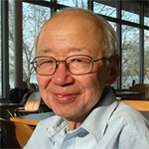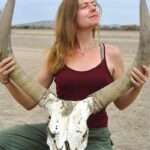
All lectures are presented fully online via Zoom every Friday at 3:30 PM. The link to join the meeting is https://go.wisc.edu/l880yf except when otherwise indicated. Alumni, friends and the public are always invited to attend.
 February 23rd – Dynamics of abrupt change in tropical African forests
February 23rd – Dynamics of abrupt change in tropical African forests
Sarah Ivory, Penn State University
Tropical forests provide essential resources, including food, fuel, and medicine, to millions of people in Africa as well as having links to ecosystem services that include fisheries and freshwater. Abrupt changes in ecosystems have the potential to occur on human timescales. Although paleoecological data is well suited to answering questions about the timing and pace of vegetation change, detecting spatial patterns requires a network of sites that is often inaccessible. Until recently, data availability in Africa was too limited to evaluate tipping points in Afrotropical forests that would strain adaptive capacity in this region. However, recent advances in legacy data standardization following FAIR data standards have made it possible to pose scientific questions about past ecosystem change that were previously not possible in Africa. In order to this, the African Pollen Database (APD) has recently been relaunched as a constituent database within the Neotoma Paleoecology Database and newly developed open-access tools were used to identify abrupt change events since the Last Glacial Maximum (21ka).
 March 1st – Headquarters of the Communists and Taiwan Independence People: Madison and the Midwest in Geographies of Taiwanese Student Activism
March 1st – Headquarters of the Communists and Taiwan Independence People: Madison and the Midwest in Geographies of Taiwanese Student Activism
Wendy Cheng, Scripps College
In the early 1970s, University of Wisconsin-Madison was infamous to Kuomintang (KMT) officials as the “headquarters of the Communists and Taiwanese independence people” – referring to student migrants from Taiwan and Hong Kong who had gone to the U.S. for graduate study and become politicized. This talk discussed how Madison and the Midwest more broadly became key nodes in networks of activism and consciousness-formation for Taiwanese who migrated to the US as graduate students from the 1960s to 1980s. Conditioned by both Cold War routes of selective immigration preferences and authoritarian surveillance enabled by the U.S. support of the KMT, a generation of activists developed their politics and activist praxis under deeply contradictory circumstances that continue to shape both the possibilities and limitations of Taiwanese/American politics today.
 April 12th– Greenhouse production of and on the urban(izing) frontier: Infrastructure, agrarian questions, and settler imaginaries
April 12th– Greenhouse production of and on the urban(izing) frontier: Infrastructure, agrarian questions, and settler imaginaries
Nathan McClintock, Institut national de la recherche scientifique (INRS)
Recent disruptions to the food system caused by the pandemic, extreme weather events, and the war in Ukraine, have given a significant boost to the promotion and expansion of greenhouses as a key infrastructural component of agri-food production. Greenhouse development is not limited to rural agricultural areas, however, but have also become prominent in urban and community (re)development projects in a range of commercial and non-commercial settings. In this talk, I engage with classic debates in agrarian political economy and more recent debates on socioecological fixes to think through how greenhouse expansion serves to overcome natural obstacles to production, while also articulating with green entrepreneurial development goals. I then discuss how such a fix also depends on a suite of settler-colonial logics and discursive practices. Drawing on examples from two starkly different landscapes – urban Montréal and the Canadian Arctic – I explore how greenhouse infrastructures (and the imaginaries upon which they are poised) reinscribe colonial and developmentalist logics at these two distinct urban(izing) frontiers of (re)development, while in some cases also serving as spaces of contestation and self-determination.